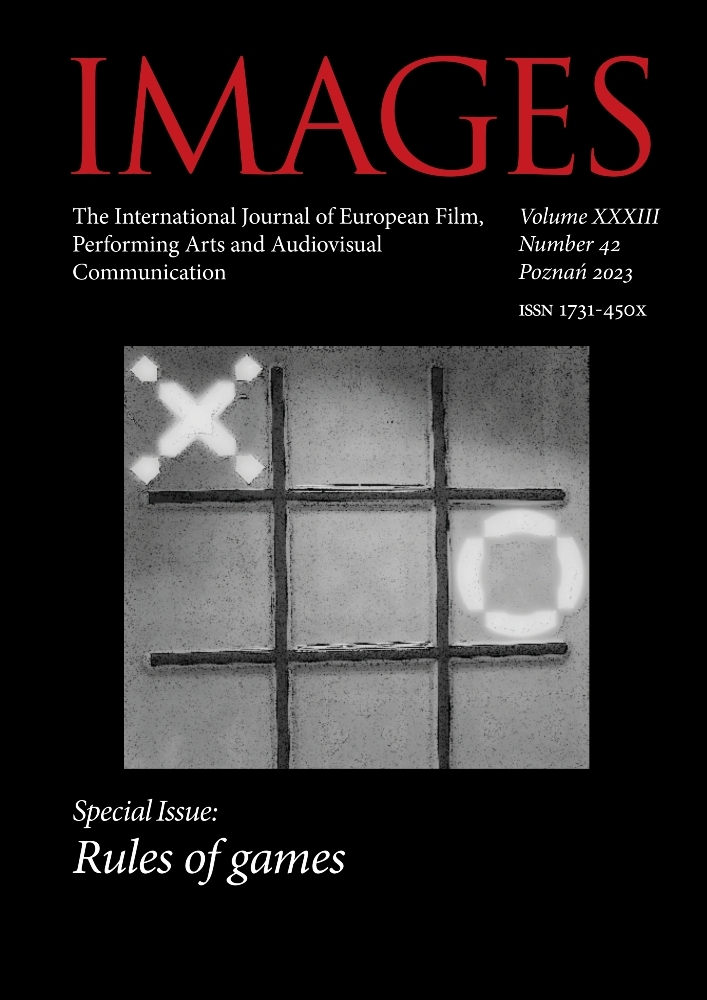Abstrakt
The article discusses the communicative and artistic practice grophilia, which is appropriate for the culture of participation. It consists in the transfictional use of the structures and poetics of digital games in the field of various arts. The points of reference for the analysis of grophilia are three popular series distributed on the Netflix streaming platform: Cyberpunk: Edgerunners, Arcane and Love, Death + Robots. The author analyzes these works, focusing on the systemic character of grofil practices, the aesthetics of grofil texts and their transmedia and transdiscursive specificity. She indicates that grophilia, like genres, can be treated as an artistic strategy that precedes realizations, creates new forms of narration and guides how the work is received.
Bibliografia
Birkholc R., Narracja subiektywnie zapośredniczona. Wokół zagadnienia „mowy pozornie zależnej” w filmie, „Studia Europaea Gnesnensia” 2016, nr 14, s. 143–158. DOI: https://doi.org/10.14746/seg.2016.14.8
Bordwell D., Narration in the Fiction Film, Madison, Wisconsin 1985
Brogowski L., Struktura konkretności i miejsca niedookreślenia u Ingardena, „Teksty Drugie” 1993, nr 3, s. 63–80
Crucchiola J., All 43 Video-Game Movies, Ranked. Some of them are even pretty good, Vulture, 11.04.2022, https://www.vulture.com/2016/12/every-video-game-movie-ranked-bad-to-worse.html (dostęp: 6.01.2023)
Davis V., ‘Arcane’: Overcoming the ‘Curse’ of Video Game Adaptations, AWN.com, 9.11.2021, https://www.awn.com/animationworld/arcane-overcoming-curse-video-game-adaptations (dostęp: 6.02.2023)
Garda M.B., Modele fuzji gatunkowej w grach cyfrowych, [w:] Trajektorie obrazów. Strategie wizualne w sztuce współczesnej, red. R.W. Kluszczyński, D. Rode, Łódź 2015, s. 69–77
Genette G., Palimpsesty. Literatura drugiego stopnia, [w:] Współczesna teoria badań literackich za granicą. Antologia, red. H. Markiewicz, przeł. A. Milecki, Kraków 1992, s. 317–366
Hanley K.W., All Episodes Of “Love, Death + Robots”, Ranked From Dope To Nope, BuzzFeed, 21.05.2022, https://www.buzzfeed.com/kenwhanley/all-episodes-of-love-death-robots-ranked-from-dope-to-nope (dostęp: 6.01.2023)
Januszkiewicz M., W horyzoncie nowoczesności: antybohater jako pojęcie antropologii literatury, „Teksty Drugie” 2010, nr 3, s. 60–78
King D., Game Over, Uwe Boll, Vanity Fair, 27.03.2017, https://www.vanityfair.com/hollywood/2017/03/game-over-uwe-boll-worst-director (dostęp: 6.01.2023)
Kubiński P., Gry wideo w świetle narratologii transmedialnej oraz koncepcji światoopowieści (storyworld), „Tekstualia” 2015, nr 4(43), s. 23–36 DOI: https://doi.org/10.5604/01.3001.0013.4243
Kubiński P., Gry wideo. Zarys poetyki, Kraków 2016
Kulczycki E., Teoretyzowanie komunikacji, Poznań 2012
Lubelski T., Nowa Fala. O pewnej przygodzie kina francuskiego, Kraków 2020
Maj K.M., Allotopia – wprowadzenie do poetyki gatunku, „Zagadnienia Rodzajów Literackich” 2014, nr 67(1), s. 91–105
Maj K.M., Ucieczka od linearności. W stronę światocentrycznego modelu narracji transmedialnych, [w:] Narratologia transmedialna. Teorie, praktyki, wyzwania, red. K. Kaczmarczyk, Kraków 2017, s. 283–308
Mamerow M., Gaming Industry vs. Other Entertainment Industries (2023), Raise Your Skillz, https://raiseyourskillz.com/gaming-industry-vs-other-entertainment-industries-2021/ (dostęp: 6.01.2023)
Marciniak P., Transfikcjonalność, „Forum Poetyki” 2015, nr 2, s. 102–107. DOI: https://doi.org/10.14746/fp.2015.2.26696
Mirowski J., Uwe Boll, twórca fatalnych ekranizacji gier, kończy filmową karierę, GRY- Online, 27.10.2016, https://www.gry-online.pl/newsroom/uwe-boll-tworca-fatalnych-ekranizacji-gier-konczy-filmowa-kariere/z618a48 (dostęp: 6.01.2023)
Park B., Kwon D., ‘The questions that need to be asked in the face of conflict’: A conversation with the co-creators of Arcane, Inven Global, 13.11.2021, https://www.invenglobal.com/articles/15671/the-questions-that-need-to-be-asked-in-the-face-of-conflict-a-conversation-with-the-co-creators-of-arcane (dostęp: 6.01.2023)
Pigulak J., Gra w film. Z zagadnień relacji między filmem i grami wideo, Kraków 2022
Pigulak J., Ponad inter-, w kręgu trans-. Nowelizacje gier wideo jako przykład narracji
transmedialnych, „Forum Poetyki” 2019, nr 18, s. 36–49
Rozbite głowy, wyrywane wnętrzności. Serial „The Last of Us” będzie jak gra?, TVPInfo, 28.12.2022, https://www.tvp.info/65342793/the-last-of-us-szczegoly-powstajacego-serialu- (dostęp: 6.02.2023)
Ryan M.L., Story/Worlds/Media. Tuning the Instruments of a Media-Conscious Narratology, [w:] Storyworlds across Media: Toward a Media-Conscious Narratology, red. M.L Ryan, J.N. Thon, Lincoln – London 2014, s. 25–49 DOI: https://doi.org/10.2307/j.ctt1d9nkdg.6
Saint-Gelais R., Fictions transfuges. La transfictionnalité et ses enjeux, Paris 2011
Serial „The Last of Us” święci triumfy. „Miał bardzo wysoko zawieszoną poprzeczkę”, TVN24, 22.01.2023, https://tvn24.pl/kultura-i-styl/serial-the-last-of-us-michal-walkiewicz-z-filmwebu-o-produkcji-hbo-max-6643520 (dostęp: 6.02.2023)
Sonczyk W., System medialny: zakres – struktura – definicja, „Studia Medioznawcze” 2009, nr 3(38), s. 66–75
Tan A., Why do you love Arcane so much? Creators reveal behind-the-scenes secrets, ONE Esports, 5.12.2022, https://www.oneesports.gg/league-of-legends/arcane-creators-interview/ (dostęp: 6.02.2023)
Tassi P., Cyberpunk 2077’s Playercount Is Up Nearly 300% Thanks To ‘Edgerunners’, Forbes, 16.09.2022, https://www.forbes.com/sites/paultassi/2022/09/16/cyberpunk-2077s-playercount-is-up-nearly-300-thanks-to-edgerunners (dostęp: 6.01.2023)
United States TV audience demand for Love Death + Robots, Parrot Analytics, https://tv.parrotanalytics.com/US/love-death-plus-robots-netflix (dostęp: 6.01.2023)
Verdu M., Let the Games Begin: A New Way to Experience Entertainment on Mobile, Netfilx, 2.11.2021, https://about.netflix.com/en/news/let-the-games-begin-a-new-way-to-experience-entertainment-on-mobile (dostęp: 6.01.2023)
White P., Netflix Eyes More Video Games Based On Its Own IP As It Comes Up To One-Year Anniversary Of Launch, Deadline, 18.10.2022, https://deadline.com/2022/10/netflix-video-games-ip-1235148565/ (dostęp: 6.01.2023)
Akira (1988), reż. Katsuhiro Ōtomo
Arcane (2021), reż. Christian Linke, Alex Yee
Black Mirror: Bandersnatch (2018), reż. David Slade
Cowboy Bebop (1998–1999), reż. Shin’ichirō Watanabe
Cyberpunk: Edgerunners (2022), reż. Rafał Jaki, Mike Pondsmith
Halo: The Series (2022), reż. Kyle Killen, Steven Kane
Hardcore Henry (2016), reż. Ilya Naishuller
High Score: Złota era gier (2020), reż. William Acks, Sam LaCroix, France Costrel, Melissa Wood
Matrix (1999–2021), reż. Lana i Lilly Wachowskie
Miłość śmierć i roboty (2019–), reż. Tim Miller, David Fincher
Nirvana (1997), reż. Gabriele Salvatores
Player One (2018), reż. Steven Spielberg
Scott Pilgrim kontra świat (2010), reż. Edgar Wright
The Last of Us Series (2023), reż. Neil Druckmann, Craig Mazin
Tomb Raider (2018), reż. Roar Uthaug
Tron: Dziedzictwo (2010), reż. Joseph Kosinski
BioShock (2K Games, 2007)
Cyberpunk 2077 (CD Projekt Red, 2020)
Dead Space (EA Redwood Shores, 2008) DOI: https://doi.org/10.1079/PAVSNNR20083063
Death Stranding (Kojima Productions, 2019)
Detroit: Become Human (Quantic Dream, 2018)
Deus Ex: Mankind Divided (Eidos Montreal, 2016)
Dishonored (Arkane Studios, 2012–2017)
Fallout (Interplay Entertainment, Bethesda Game Studios, 1997–2018)
Halo (Bungie, 2001–2021)
Horizon: Forbidden West (Guerrilla Games, 2017–2022)
Horizon: Zero Dawn (Guerrilla Games, 2017–2022)
Immortality (Sam Barlow, 2022)
League of Legends (Riot Games, 2009)
Mass Effect 2 (BioWare, 2010)
Minecraft: Story Mode (Telltale Games, Mojang Studios, 2015)
Obcy: Izolacja (Creative Assembley, 2014)
Oxenfree (Night School Studio, 2016)
Star Wars: The Old Republic (BioWare, Electronic Arts, 2011)
Stranger Things: 1984 (BonusXP, 2017)
Stranger Things 3: The Game (BonusXP, 2019)
The Last of Us (Naughty Dog, 2013–2020)
Valiant Hearts: Coming Home (Ubisoft, Old Skull Games, 2023)
Wiedźmin (seria) (CD Projekt Red, 2007–2016)
Licencja
Prawa autorskie (c) 2023 Joanna Pigulak

Utwór dostępny jest na licencji Creative Commons Uznanie autorstwa 4.0 Międzynarodowe.

